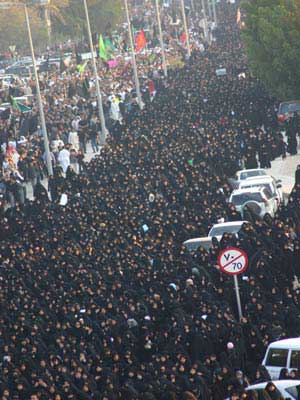English PEN calls for the immediate and unconditional release of all those currently detained in Bahrain for the peaceful exercise of their opinions, including Dr Alsingace, and seeks immediate guarantees of their safety.
Convicted by special security court
It reminds the Bahraini authorities of their obligations to protect the right to freedo m of expression as guaranteed by Article 19 of the International Covenant on Civil and Political Rights, to which Bahrain is a signatory, and is alarmed at the apparent use of excessive force to suppress peaceful dissent, reminds English PEN.
m of expression as guaranteed by Article 19 of the International Covenant on Civil and Political Rights, to which Bahrain is a signatory, and is alarmed at the apparent use of excessive force to suppress peaceful dissent, reminds English PEN.
According to organisation’s information, Dr Alsingace, head of the human rights office of the Haq Movement for Liberty and Democracy, was among twenty-one opposition activists to be convicted by a special security court on 22 June 2011 of ‘plotting to overthrow the government’ following a wave of protests which swept the country in February and March 2011.
Eight of those convicted received life sentences, including Dr Alsingace. A further ten were sentenced to fifteen years in prison, two received five-year terms and one a two-year prison sentence.
Alsingace’s whereabouts unknown
Dr Alsingace was arrested at Bahrain International Airport on his return from London on 13 August 2010, where he had been attending a conference at the House of Lords during which he had criticised Bahrain’s human rights practices.
He was initially accused of ‘inciting violence and terrorist acts’, before being formally charged under national security and counter-terrorism legislation. Dr Alsingace was held incommunicado and in solitary confinement for six months.
He was severely tortured in his six months incarceration, blindfolded, deprived of his glasses and crutches (he is severely disabled as a result of polio since his birth), hanged from hands and knees, subjected to electric shocks with what appears to be Taser machine and deprivation of sleep. His two sons were also arrested as means of pressure.
He and all those on trial with him were freed in February 2011 following widespread calls by anti-government protestors for political reform and the release of political prisoners.
He was re-arrested on 16 March 2011 after publicising the deteriorating human rights situation in the country, and was later placed under house arrest. His current whereabouts are unknown.
Dr Alsingace taught engineering at the University of Bahrain and authors his own blog. He was previously detained in 2009 and held for several months on charges of plotting to overthrow the government before being given a royal pardon.
English PEN calls to take action and to send letters of appeal to Bahraini authorities urging them to release unconditionally Dr Alsingace and all those currently detained in Bahrain. Find out more details here.
Other prisoners of conscience
Dr Saeed Shehabi, a UK citizen, who has also received a life sentence in absentia is a journalist with a weekly column at Al Quds Al Arabi (and Arabic daily published in London) and a former editor of the Arabic weekly (Al Aalam).
Ali Abdul Emam, the most known blogger in Bahrain, received a 15 years sentence after being tried in absentia. He is the founder of Bahrainonline.org, the largest and most popular website in Bahrain. He had been arrested last summer together with more than 500 Bahrainis in a government crackdown against the opposition.
Two weeks ago, Ayat Al Qurmuzi, a 20 year old poet was jailed for one year for reciting a poem in February at Pearl  Square.
Square.
The attack on freedom of expression has claimed many other victims. Among them is Dr Mansoor Al Jamri, the editor of the semi-independent daily newspaper, Al Wasat, who is on trial with other staff members for publishing news unfavourable to the government.
While most of the victims have been Shia Muslims, at least one Sunni Bahraini has been punished for expressing his views; Mohammad Bu Flasa disappeared on 17 February shortly after addressing the crowds at Pearl Square. He is still languishing in jail.
Background
Protests led by Bahrain’s majority Shia community against the government’s policies have been underway since mid-February 2011.
The Bahraini security forces have responded with excessive force, using tear gas and live bullets to disperse demonstrators. Dozens of civilians have reportedly been killed and many more wounded.
The Bahraini government declared a State of Emergency on 15 March 2011 and brought in troops from neighbouring Gulf countries including Saudi Arabia to help suppress dissent. The State of Emergency was lifted on 3 June 2011 but those arrested and charged under that law have not been released. Opposition sources estimate that some four hundred people are currently on trial for their support of the protests, and further demonstrations are now expected.
Related articles:





